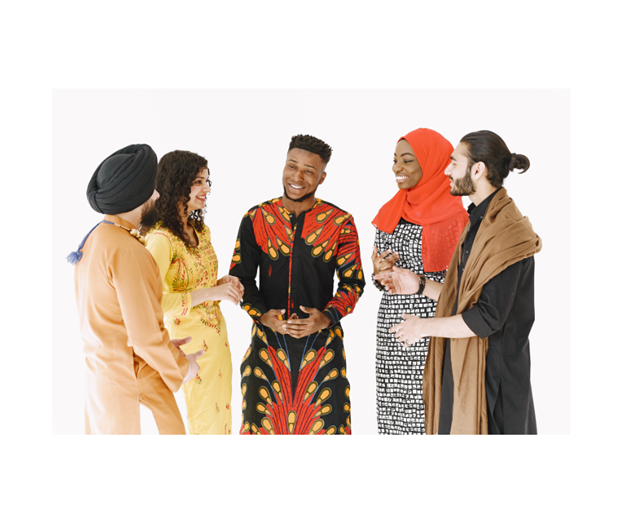Upholding Black Heritage in Multicultural Canada: A Personal Reflection
By Damilola Kadiri

As a Black immigrant in Canada, I find Canada’s multicultural society phenomenal. It’s exciting to be exposed to the Canadian culture and the many other cultures represented here. While this expands one's understanding of the world, there is a delicate balance between learning about these new cultures and preserving the Black heritage. Respect, spirituality, resilience, and connectedness are some of the major attributes of the Black race. Does being in other parts of the world mean disregarding our Black heritage?
I have encountered some Black families here and observed two sides. I’ll describe category ‘A’ as those who seem to have downplayed their cultural heritage. They only identify as Black because they acknowledge that their ancestry is traced to the Black race. The second category, ‘B’, includes those who maximize every opportunity to display their Black heritage. People I have come across in this category are extra intentional about preserving their culture. From speaking their native languages to exposing themselves to literature in these languages, wearing their cultural attires, cooking cultural meals, and sharing with friends; they look for ways to be expressive about their culture.
Reflecting on my encounters so far with individuals in category B, I have been both surprised and inspired by the depth of intentionality in preserving the Black culture. Some time ago, my family met another Black family at church, and started building a friendship. Soon enough, we were shocked to discover we were related. Realizing this, their children would greet us culturally wherever we met, including in open spaces like the church. Their teenage son would prostrate (bowing almost to the ground), while their little daughter would kneel (typical of the Yoruba tribe in Nigeria).
Do I have to make my children do this, in honour of their African heritage, as was the case here? Absolutely not.
I read another story of a Black lady who had to stop wearing wigs and extensions because her daughter was not comfortable with her own black hair. The little girl kept asking her mum why her hair was different from other girls her age. She didn’t realize that their different cultural roots were responsible for this. Over time, the mom gave up her artificial extensions to make her daughter feel more comfortable with her black hair. Currently, they both wear their natural hair in locs.
As a Black immigrant, you may be thinking, “There is no way I’m doing any of these.”
And that is fine; there is no right or wrong way to hold up your cultural heritage. But here are a few pointers you could consider:
- Food:
Despite potential cost hurdles, keeping up with your traditional foods can be a great way to stay connected to your cultural roots. If you have young children who are Canadian-born or immigrated at a young age, you may consider introducing cultural meals to your family’s menu.
- Clothing:
One of the ways you can readily identify a Black person is when they are culturally dressed. Our traditional attires are mostly colourful and difficult to miss. Thankfully, such cultural outfits are beginning to gain acceptance in the Canadian workplace. Immigrant Services Calgary is a great example of an organization that celebrates cultural diversity and permits employees to be expressive about their cultures. Recently, a colleague wore a beautiful African print dress and had everyone wowing. She said it reminded her of her cultural roots, and she was excited the dress code allowed it.
- Language:
Most Black people have a language that is native to them. If you have family members or friends with whom you have a common native language, you may want to speak this to one another to ensure it is preserved and passed on to the next generation.
- Communities and Associations:
Joining a community (such as national associations or alumni groups) from your home country is also a great way to stay connected. Such communities foster a sense of belonging and solidarity, echoing the African philosophy of Ubuntu—I am, because we are.
As the Black population in Canada continues to grow, it presents an opportunity to share the richness of the Black culture with others. Whether it’s through communal gatherings, cultural outfits, linguistic diversity or meals, you can find your unique way of upholding the Black heritage.
About the Author
Damilola Kadiri is an international communications professional and author. She currently works as the communications lead at Immigrant Services Calgary. Outside work, she enjoys spending time with her family, reading, listening to gospel music, and learning new things.
Read More Newcomer Stories
- Ashenda: Celebrating Diversity During Black History Month – Immigrant Services Calgary
- Breaking Down the Myths about Immigrants in Canada – Immigrant Services Calgary
- Meet Tamara: A mother’s fight – Immigrant Services Calgary
- Meet Olena: A Compassionate Interpreter for Ukrainian Newcomers in Calgary – Immigrant Services Calgary
- Tides are changing, but parades must keep marching – Immigrant Services Calgary
- Building capacity and creating connections: why volunteering is vital to non-profits and community – Immigrant Services Calgary
- A lifelong friendship: Nurturing connections on the path of immigration – Immigrant Services Calgary
- Immigrating to Calgary allowed me to be openly gay—but our city needs more spaces for LGBTQ+ Calgarians
- Meet Hanna: Escaping the war in Ukraine to find community in Calgary
- Dawari’s Journey: A Beacon of Hope for Newly Arrived Refugees in Calgary
💙Be inspired by the real-life journeys of newcomers
